Letter from Thailand - Creativity is everything in the new theatre ecology under pandemic conditions
Staying Connected
When the world changes, you have to reinvent yourself: Sukanya Sompiboon is impressed by the creativity and innovation that theater makers displayed during the pandemic, but also by their political resistance. The author, herself an actress and director, sends a theater letter from Thailand.
by Sukanya Sompiboon
8. November 2021. One might say that theatre is human connection at the moment of performing, which is a mutual sharing of experience amongst actors, crew and audience members. It could also be said that nothing can replace the authentic connection of performers and audiences present at the same place. But the challenging question with the world under lockdown conditions was: 'Could stage theatre stay alive without live performance?’, or 'When we, performers and audience members, cannot breathe and interact in the same space, what remains of the essence of the theatre?', or 'Does theatre still need to be watched live?'. The answers to these questions might be mixed, but initiative, adaptation and innovation in theatre was essential in these hard times.
The show must go on(line)
After the Thai government’s announcement of the lockdown in March 2020, live theatre as well as film and televised drama shooting had been suspended, postponed or cancelled. A new ecosystem of online streaming has thus become a lifesaver: Theatres did resort to technology to keep their audiences engaged. According to thestandard.co of September 27, 2020, during the five months lasting from March to July 2020, there were 51 filmed and recorded Thai plays streamed via Facebook, YouTube, Vimeo, and AIS Play – only 14% of which demanded payment. The average admission rate is approximately 198 baht, which is cheap, compared to the normal theatre ticket price of between 200 and 6,000 baht. This lower price should be accessible to most audiences. Nevertheless a great number of theatre companies brought their productions to virtual platforms for audiences to watch from home and free of charge at the early stage of the pandemic.
Digital and online technologies also played a crucial role in education. Many universities that run courses in performing and theatre arts had to adjust their modes of instruction and course evaluation. To receive ones grade, a full script and a detailed production plan were required, replacing live performances. Filmed theatre was an alternative, too. In acting classes, blended learning was in place. A teacher might deliver a lecture via Zoom and put their dancing, singing, or acting on Google classroom as examples for students. Students might stage a monologue or a dialogue with friends or create a variety of characters that could be edited, using filming techniques. From April 2020 on, the Broadway-like musical theatre troupe Rachadalai Theatre offered a re-staging of four musical performances through a streaming platform. Audiences could access the shows by registering for a monthly paid package.
Artists in survival mode
In 2020, the non-profit organization Thai Theatre Foundation conducted a survey of 180 people, including theatre makers, university instructors, theatre producers and administrators about the effect of Covid-19. The survey showed that more than half of the artists had only a three-month reserve of money. Only seven of the respondents received subsidies from the government. Some of them had more than one job to be able to survive. Full-time government employees, particularly practitioners of Thai traditional theatre, received regular financial support.
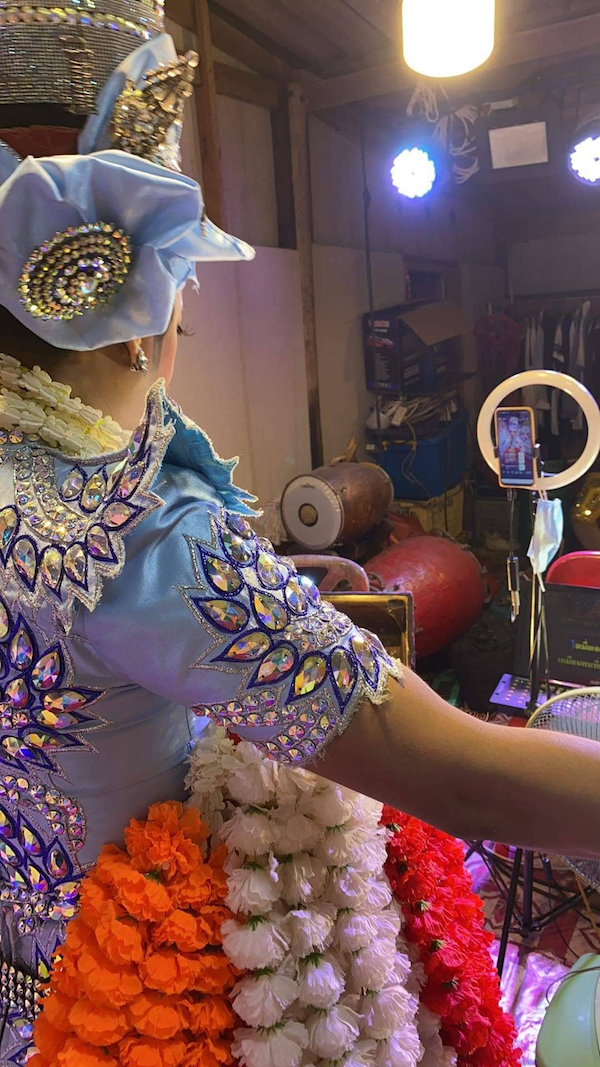 Likay performers prepare for a live-streaming performance using a mobile phone © Cr. Nipat JongdeeHowever, the circumstances were not the same for the private theatres and for freelance actors and actresses. Many self-employed artists opted to sell food and other consumer products online to survive. These were and are difficult and challenging times for the entertainment industry.
Likay performers prepare for a live-streaming performance using a mobile phone © Cr. Nipat JongdeeHowever, the circumstances were not the same for the private theatres and for freelance actors and actresses. Many self-employed artists opted to sell food and other consumer products online to survive. These were and are difficult and challenging times for the entertainment industry.
Daraka Wongsiri, a director and playwright of "Thuen Thuek" (Lone Woman), a new short play tele-theatre, presented via Zoom in April 2020, asserted that she aimed at keeping theatre alive for quarantined audiences. All performers rehearsed and performed from their homes. Props, makeup and costumes were prepared and arranged by the performers themselves. Daraka and her Dreambox Theatre Company hoped that this experimental tele-theatre production might pave way for an alternative theatre, which could be a live stream of a full performance in the future. Because of the low-tech nature of some of the performers’ equipment, what went on behind-the scenes was more hilarious than the comic story itself. They should present these rehearsals as an innovative part of the production.
In June 2020, QTQT Showcase presented an adaptation of Phoebe Waller-Bridge’s comedic play "Fleabag" in a Thai version called "Ran Ruedee" (Lustful Heart), which was directed by Rungsimant Kitchaichareon. The play ran from June 2nd to 11th, 2020 – ten days of ten rounds of performances by five actors. All performances were transmitted via Zoom with a 30-seat audience per round. The tickets were sold on a first come first served basis.
Performing in one's private space
One of the most outstanding online plays was the production of In Own Space. Thai artists were asked to create a theatrical event from their space to reskill and upskill theatre practice as well as to build a relationship with the audience members. Individual artists collaborated and created successive solo performances in their "personal space". The performances were separate but connected to each other by a message, inspiration, as well as props from the foregoing performance which was passed on to the next performer. Fifteen 2-minute plays over fifteen days were shown from 6th to 20th April 2020 by fifteen artists. Audiences either watched the separate parts or spent 15 days watching the show continuously. The complete 30-minute story was presented on April 21, 2020. Nontawat Machai, a theatre maker from LanYim (Smiling Ground) Theatre, commented that through this process the artists relearned their skills in improvisation to construct a storyline from one another and to make one unified story.
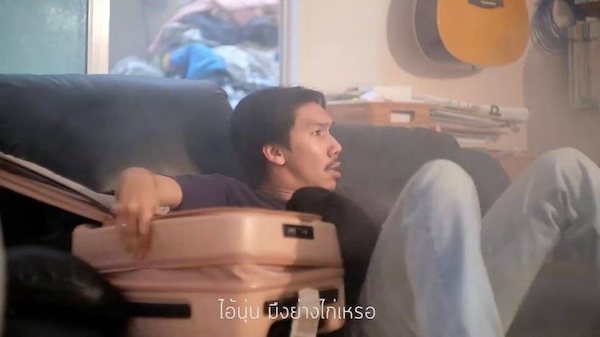 Packing a suitcase: the first story of "In Own Space" © Cr. Kwin Bhichitkul
Packing a suitcase: the first story of "In Own Space" © Cr. Kwin Bhichitkul
The first artist told the story of a character who is packing a suitcase to go somewhere. The smell of roasted chicken floats in the air. The main idea of this first scene was sending love to his beloved ones if one day he might depart. The second artist took the smoke or smell from the first story as inspiration for the stress of movement in the bathroom. Thai Khon, a pantomime mask dance, was displayed by the fourth artist, using the symbol of masking to show his discomfort from wearing a hygienic mask. The fifth performer went with the topic of discomfort and used the rhythm of a monkey scratching himself drawn from Khon to bring out the confusion. The eighth artist chose to criticize the performances of the previous seven artists. The story connected and continued until the fourteenth performer presented a story questioning whether we could actually stay in the house. The fifteenth artist presented a boring lazy life with a chair and the show concluded that although facing hard times, we still have to go on living our lives.
Glimpses of state grants, new productions and a tragedy
The government has not totally ignored supporting contemporary theatre and artists. The Office of Contemporary Art and Culture gave grants to ten Silpathorn Award artists (an award given to contemporary Thai artists). On this (minor) support from the government to encourage the artists to conduct creative works in the pandemic situation, they could show their respective performing adeptness online from June 11th to June 15th, 2020. The 6 to 17 minutes showcases entitled Co With Us revealed a variety of skilled, talented, and creative plays and shows, including animation, puppets, live music, as well as short films and music videos.
After the lockdown was loosened, many theatre troupes prepared their productions for the Bangkok Theatre Festival (BTF) and performed live at the Bangkok Art and Culture Centre (BACC) in November 2020. Theatre troupes such as B-Floor Theatre Troupe, 8x8 Theatre Troupe, Baby Mime Theatre Troupe, Pichet Klunchun Dance Company and Anatta Theatre Troupe presented their brand-new productions under the motto "We Make It Possible". The theatre audience was restricted to 50 percent capacity.
Likay performers trained in Thai tradition-based popular theatre started performing online in order to earn their living from their fans. Some artists have found new ways to exhibit their creativity by performing solo dances and individual singing with full costume and makeup. However, this method could not help all Likay members, and sadly at least two Likay artists have committed suicide, due to economic devastation.
Staging public resistance to the government
From May 2020, theatre activists who have suffered not only from the impact of Covid-19 but also from political repressions, have organized and demonstrated performing activities of pro-democracy. Artists-Activists who joined protests had created many works of political performing arts to present injustice and oppression in Thailand. They have gathered to create and perform a number of plays and performances to show resistance to the government. From 'Flash Mobs' to 'Mob Fests', activists performed a variety of artistic genres, such as rap songs, fashion shows, music and street plays.
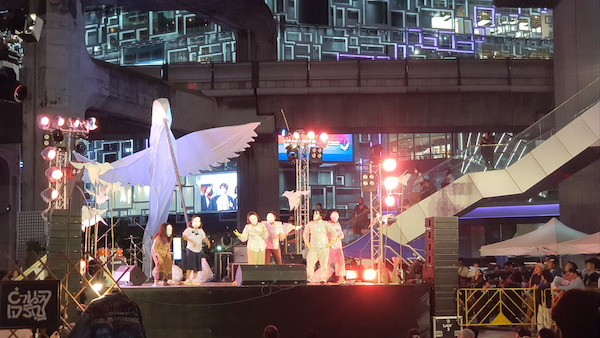 A critical parade of bird puppets: "khon Geb Khaya" (Gabage Collectors) © Cr.Pisit Noiwangklang
A critical parade of bird puppets: "khon Geb Khaya" (Gabage Collectors) © Cr.Pisit Noiwangklang
One significant show was a parade of white bird puppets flown by puppeteers around Democracy Monument in the center of Bangkok with a Thai version of the song "Do You Hear the People Sing?" from Les Misérables. This performance symbolized freedom and non-violence on the part of the crowd. The white bird puppets were used again along with a white mask by performers in a play called "khon Geb Khaya" (Gabage Collectors) at Bangkok Art & Culture Centre BACC in November 2020.
Since the spread of the third and fourth waves of Covid-19 infections from April 2021, the Center for COVID-19 Situation Administration (CCSA) has divided the country into 4 zones, namely a dark-red zone, which is put under the strictest of restrictions; the red zone, orange zone, and yellow zone, in which the restrictions are loosened consecutively. However, the dark-red and red zones were 66 of 77 provinces. Most entertainment venues were still closed and very few open-air live performance venues were open for hybrid shows – live performance that are watched by a small number of audiences in a venue together with a large audience live streaming them at home. Many troupes continue producing online live performances, some release recordings from (past) live productions. Some present the filmed theatre productions. For instance, Prapassorn Chansatitporn, a theatre director from the department of Speech Communication and Performing Arts at Chulalongkorn University, has shot the filmed theatre “Ubasute Sound”, replacing a live show which was canceled due to the Covid-19 restrictions.
The impact of Covid-19 on artists who have to struggle for survival has been felt for over one and a half years now. And still nobody knows when this pandemic will end. But if one has no choice, creativity and flexibility become the order of the day. The pandemic has opened new paths through artists' creativity and highly innovative methods. Artists need to learn, relearn, and unlearn. Self and artistic reinvention might be the key to the survival of theatre and theatre makers – not only while we all wait for the storm to pass.
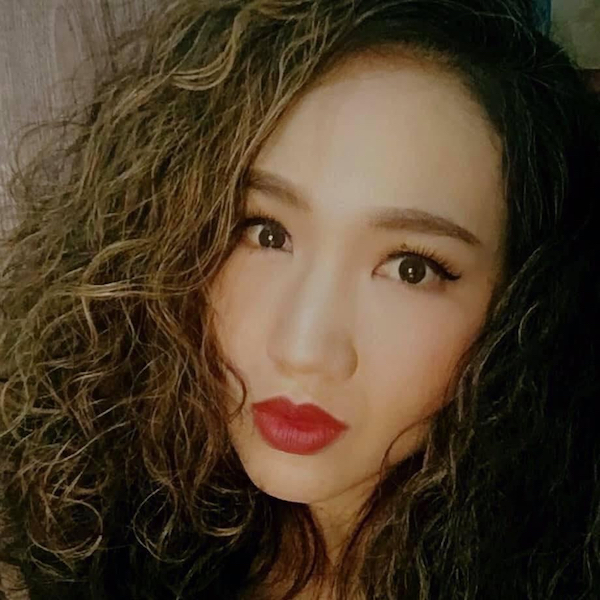 Sukanya Sompiboon © privatSukanya Sompiboon is currently a lecturer in the Department of Speech Communication and Performing Arts, Faculty of Communication arts, Chulalongkorn University. She is a singer, actress, director, and playwright of traditional-popular and contemporary theatre. She works as individual artist and as a member of Anatta Theatre Troupe. During the Covid-19 lockdown, Sukanya and friends went online to stream mini concerts as well as online reflections and discussions on theatre.
Sukanya Sompiboon © privatSukanya Sompiboon is currently a lecturer in the Department of Speech Communication and Performing Arts, Faculty of Communication arts, Chulalongkorn University. She is a singer, actress, director, and playwright of traditional-popular and contemporary theatre. She works as individual artist and as a member of Anatta Theatre Troupe. During the Covid-19 lockdown, Sukanya and friends went online to stream mini concerts as well as online reflections and discussions on theatre.
This article is part of a cooperation between the International Research College "Interweaving Performance Cultures" at Freie Universität Berlin (editors: Clara Molau, Antonija Cvitic) and nachtkritik.de (editor: Elena Philipp).
So far, Letters from Argentina, Chile, Egypt, Uruguay (German only), South Africa, Turkey (German only), Japan , Iran, China (German only) and Mexico have been published as part of the series.
A cooperation with:
![]()
Für Horizonterweiterung
Der Blick über den eigenen Tellerrand hinaus ist uns wichtig. Wir möchten auch in Zukunft über relevante Entwicklungen und Ereignisse in anderen Ländern schreiben. Unterstützen Sie unsere internationale Theaterberichterstattung.
meldungen >
- 17. April 2024 Autor und Regisseur René Pollesch in Berlin beigesetzt
- 17. April 2024 London: Die Sieger der Olivier Awards 2024
- 17. April 2024 Dresden: Mäzen Bernhard von Loeffelholz verstorben
- 15. April 2024 Würzburg: Intendant Markus Trabusch geht
- 15. April 2024 Französischer Kulturorden für Elfriede Jelinek
- 13. April 2024 Braunschweig: LOT-Theater stellt Betrieb ein
- 13. April 2024 Theater Hagen: Neuer Intendant ernannt
- 12. April 2024 Landesbühnentage 2024 erstmals dezentral


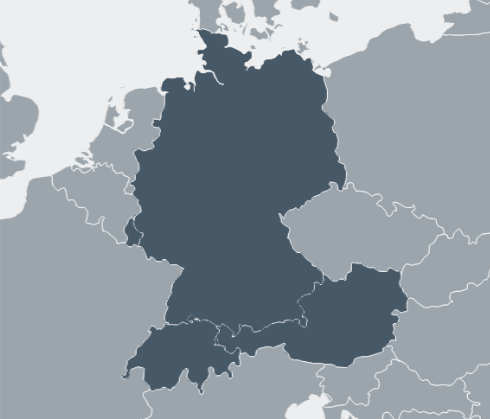
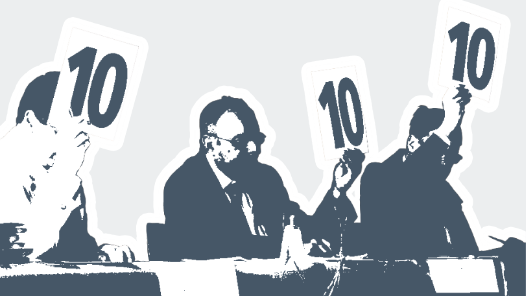
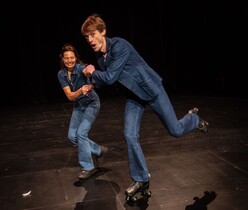



neueste kommentare >